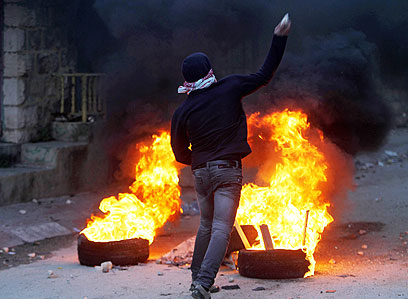The first intifada broke out 25 years ago this week. The "stones intifada," as it was referred to by the Palestinians, was largely spontaneous and spread like wildfire in the territories, partly due to the mistakes made by then-defense minister Rabin and senior IDF officials at the first stage of the uprising. Live fire and explosives were rarely used, but stones and Molotov cocktails claimed lives – on the Palestinian side as well.
That intifada turned Hamas into a leading force in the violent struggle against Israel and lasted almost four years, until it finally ended after the first Gulf War, when Yasser Arafat, who supported Saddam Hussein, realized he had bet on the wrong horse.
This reminder is necessary because it is entirely possible that we are on the brink of a similar eruption of violence in the West Bank, which may bring an end to the fragile calm achieved as a result of Operation Pillar of Defense - or at least this is what Abbas wants us to believe.
To this end, he is making certain that the Israeli and foreign press run articles on the situation in the West Bank and is also creating real tension on the ground, although he is keeping it on a low flame for now. The Palestinian president and his associates are speaking of a non-violent "peaceful intifada," but lately we have been witnessing a clear increase in the number of incidents in which stones and firebombs were hurled.
Abbas is creating this tension with four main goals in mind:
• Threatening the Israeli government so it will refrain from taking additional punitive measures following the UN's recognition of Palestine as a non-member observer state.
• Boosting his political standing in the aftermath of Hamas 'victory' during the latest round of fighting with Israel.
• As always, he is trying to receive additional financial aid from the Arab states, the US and the Europeans. Without these funds, Abbas claims, he will not be able to pay the salaries of members of his security forces, who are preventing a Palestinian uprising similar to those taking place in other parts of the Arab world.
• By threatening to launch another intifada, Abbas is also trying to strengthen the left-center bloc in Israel head of the January elections.
It is important to note that Abbas is not making empty threats. Israeli and foreign sources who are familiar with the situation have been claiming for a few weeks now that Abbas, who is calling for "non-violent resistance to the occupation," is facing serious difficulties on the ground. The same sources have identified growing incitement on the Palestinian street and increased popular support for Hamas, which favors a "violent struggle to liberate Palestine."
The frustrated Abbas is trying to ride this wave. To prove to Israel and the world that he is not making empty threats, he has instructed his security forces to stop arresting Hamas terrorists in the West Bank and has declared that he plans to promote internal Palestinian reconciliation. It appears that the Palestinian president believes he can control the flames and lower them in the event that his goals are achieved. But this is not at all certain, the sources say. He may lose control.

'IDF making same mistake.' Riot in West Bank (Photo: EPA)
Therefore, the conduct of the Israeli government and the IDF over the next few weeks is critical. There is no doubt that Abbas' 'contribution' to the diplomatic stalemate is just as great as Netanyahu's and Lieberman's. We must acknowledge the fact that at this moment both sides do not have an interest in resuming peace negotiations. In the current atmosphere, another round of disappointing talks may ignite the territories. However, Abbas' pyromania can be restrained by small steps on the ground and American-Arab aid.
The General Staff's decision to order IDF forces to act with the utmost restraint in the West Bank shows that the security establishment, headed by Defense Minister Barak, is aware of how fragile the situation is, but it appears that this policy of restraint is beginning to act as a boomerang against us. Young Palestinians are drawing inspiration from video clips showing IDF soldiers running away from Palestinians throwing stones and Molotov cocktails. This increases their motivation to join the rioters.
While it is true that one or two Palestinian casualties may ignite the area, sending small forces to deal with riots is a certain recipe for putting the forces in compromising situations in which they will have to use live fire or flee. Either response will lead to more incitement and friction.
It appears as though the IDF is beginning to make the same crucial mistake it made at the beginning of the first intifada, when small forces failed to deter the rioters and had to use live fire, thus creating "shahids (martyrs)" for Fatah and Hamas. Therefore, the IDF must change its modus operandi to secure a quantitative advantage during any riot. At the same time it must initiate activity that will prevent friction and incitement on the Palestinian street. The army must particularly prevent "price tag" acts by Jewish settlers, as they may exact a heavy price from us.
















